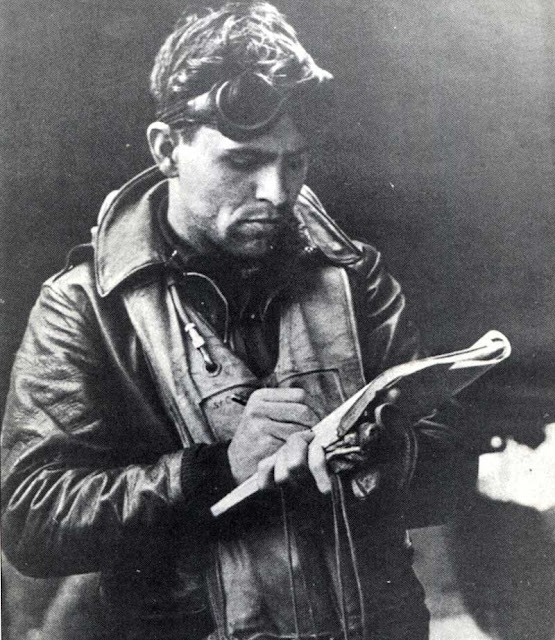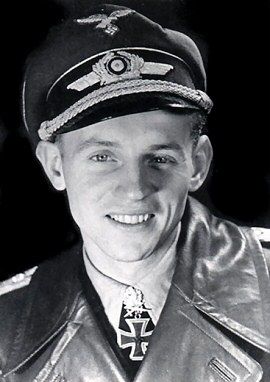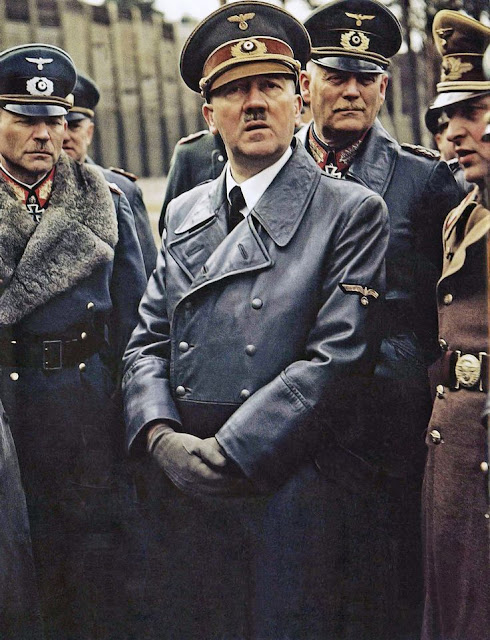 |
| An RAF pilot wearing his sheepskin Irvin Jacket. |
Here, we have a collection of
flight jackets, bomber jackets and other leather coats worn during World War II. As far as I can ascertain, these are photographs taken during the war and not "recreations" done later (unless otherwise noted). So, the fashions are authentic to the World War II period and not some modern designer's "improvement" on the originals.
 |
| General George S. Patton, Jr. |
As far as I'm concerned, it's next to impossible to look bad in a properly cut leather jacket.
 |
| An American bomber jacket in the 401st Bomb Group (US Air Force). |
Both sides used leather extensively. Though the Allies by and large reserved leather for flight operations, the Axis powers used it in normal foul-weather situations as well.
 |
| Luftwaffe ace Hermann-Friedrich “Jupp” Joppien. |
While the Luftwaffe supplied its pilots with adequate leather gear, there was a general feeling among the pilots that Allied leather bomber jackets were better than standard-issue Luftwaffe gear.
 |
| Tow pilot Susie Winston Bain in WASP leather jacket with Fifinella patch, scarf, and goggles, in 1944. |
Thus, Allied bomber jackets became treasured by many Luftwaffe pilots. Female pilots on the Allied side also wore leather.
 |
| Luftwaffe ground-attack pilot Hans-Ulrich Rudel. |
While leather was not considered formal attire on the Allied side, German portraits often feature leather, indicating that it was held in high regard.
 |
| Waist gunners of the B-17 bomber Memphis Belle. Left, waist gunner Bill Wichell and right, waist gunner Casmir Nastral, November 1942-June 1943. |
.Sheepskin had many advantages for bomber and fighter crews. In unheated bombers, it was vital to stay warm, and leather helped a great deal.
 |
| Beppo Schmidt, Luftwaffe intelligence boss during the Battle of Britain. |
Of all the fashion statements made during World War II, leather jackets undoubtedly have had the most lasting influence.
 |
| A B-17 Pilot and Crew, England 1943. |
An authentic World War II bomber jacket is worth something these days.
 |
| Luftwaffe ace Adolf Galland and his dog (colorized). |
However, not all authentic bomber jackets are the same. US Army Air Forces B-17 bomber pilots and aircrewmen early in World War II were issued the classic B-3 sheepskin leather flight jacket to protect against frigid temperatures at high altitudes. It served its purpose well.
 |
| Preparing for the 27 January 1943 US 8th Air Force’s first raid on Germany. |
While the B-3 was extremely popular (on both sides), its lacquer finish was prone to freezing. This led to a redesign.
 |
| Oblt. Rudolf Busch of I./JG51 Russia, Summer 1941. He had 40 Victories when he was killed 17 January 1943 in a mid-air collision. Busch in his 190A-3 collided with his Geschwaderkommodore (Wing Commander) Karl-Gottfried Nordmann of JG 51, who was flying an FW 190A-2. Busch was awarded the Knight's Cross posthumously in 1944, while Nordmann was grounded. |
This problem led to the eventual introduction of alpaca lined cotton flight clothing.
 |
| Luftwaffe ace Erich "Bubi" Hartmann. |
Original USAAF World War II B-3 flight jackets are quite rare today.
 |
| The crew from B-17 "Man o' War" stand in front of their plane. Standing Left to Right: James M. Stewart (P), Thomas McMillan (R/O), William Dickey (CP), Charles Meriwether (FE), Raymond Schnoyer (BTG), Jack Wheeler (TG), Hugh Langan (WG), John Creamer (B). The entire crew was lost on 9 November 1942 during a mission to Saint-Nazaire. Image courtesy of the American Air Museum website (IWM: UPL 20955). |
There also was a tanker jacket that was developed as winter combat clothing for the American Armored Corps (tank corps) during World War II.
 |
| Waffen-SS officer Gerhard Bremer in March 1944. |
Owing to a lack of cold-weather gear on the European front, the tanker's jacket was also used by fighter pilots as a flight jacket.
 |
| An Eighth Air Force pilot standing in front of his B-17. |
The tanker jacket had two models. The first model was used in 1941 only. It features a patch-style pocket. The second version was in use from 1942 onwards. The major modification was a change to to a slash pocket. The first model was perfectly adequate, and many officers retained theirs throughout the war and thereafter.
 |
| Hitler in a pre-war photo. |
The RAF Irvin sheepskin bomber jacket, first produced by Leslie Irvin in 1926, has become a symbol of the Battle of Britain.
 |
| RAF Flight Lieutenant Maurice Hewlett Mounsdon. He survived the war and lived well into the 21st Century. In fact, he apparently remains alive as of this writing. |
RAF pilots, like Flight Lieutenant Maurice Hewlett Mounsdon, above, became the rock stars of the era. There were only about 3000 pilots defending Great Britain during the Battle of Britain.
 |
| An Italian Macchi C 200 "Saetta" pilot gets ready for action. |
Other powers, such as Italy and Japan, also had leather jackets, particularly for aviators.
 |
| Luftwaffe ace Hans-Joachim Marseille. |
Other services, such as the German U-boat fleet, also used leather jackets.
 |
| A RAF pilot in his Irvin Jacket looks at his damaged Spitfire, Italy circa 1944. |
Some current bomber jackets are named after famous World War II pilots. For instance, the Heinz Bär jacket is named after the top Luftwaffe ace (252 victories) who flew with JG 51.
 |
| Hitler inspecting coastal fortifications, 23 December 1940. |
There also is a current bomber jacket named after famed Luftwaffe ace Erich Hartmann.
 |
| Another picture of Erich Hartmann in his flight jacket. |
Of course, calling an Erich Hartmann jacket a bomber jacket is a bit of a misnomer, since he wasn't a bomber pilot. I know, Hartmann wore a flight jacket - we'll get to that below.
 |
| Mary, a Spitfire pilot of the Air Transport Auxiliary, c. 1944. |
Women wore bomber jackets during World War II, too. There were many women involved in ferrying and towing planes from the earliest days of the war. They had to protect themselves from the cold, too.
 |
| Luftwaffe ace Major Heinrich "Pritzl" Bär. Heinz Bär was one of the top jet fighter pilots of all time, with an astonishing 16 victories while flying one of the first jet fighters, the Me 262. |
Bomber jackets have become iconic. Many film roles are distinguished by the star's use of bomber jackets, and the character would be virtually unrecognizable without them.
 |
| USAAF P-51 pilot William Whisner, who notched six victories on 21 November 1944. That was the highest score ever (Chuck Yeager got 5 on two separate occasions). Note the whistle clipped to his collar. |
Some examples of film stars known as much for their leather bomber jackets in certain roles as for anything else:
- John Wayne - "The Longest Day"
- Gary Cooper – “For Whom the Bell Tolls”
- Marlon Brando – “The Wild One”
- Henry Winkler – “Happy Days”
- Tom Cruise – “Top Gun”
- Harrison Ford – “Indiana Jones”
 |
| John Wayne in "The Longest Day" (1962) (courtesy 20th Century Fox). |
I couldn't resist, so there is a shot of John Wayne in "The Longest Day." No, that is not a World War II shot. Wayne, who died in 1979, was brought back via movie magic in some commercials wearing his leather jacket for I believe a soft drink decades after his death to interact with Lee Ermey (who wasn't dead). It was an iconic use of leather and a true homage to the bomber jacket fashion.
 |
| Another shot of Adolf Galland (colorized). |
The proper term for some jackets that many call bomber jackets, by the way, is "flight jackets." It's a bit confusing, though, because there were actual bomber jackets in use during the war, not just flight jackets. So, you can drill down and separate flight jackets from bomber jackets if you want. Few today really care about such distinctions in the world of fashion. In essence, flight jackets are often known generically as bomber jackets. So, if you are offended by my casual interchanging use of the terms (and I know some purists will be), I understand and extend my apologies. That's just common usage.
 |
| A bomber pilot in England, 1945. |
American flight jackets were the A-2 jacket and the G-1. In addition, there was the B-3 "bomber jacket", to the M-445, the U.S. Navy’s shearling jacket
 |
| Hermann Goering on an inspection tour at Adolf Galland's JG 26 in September/October 1940 (Federal Archive). |
Even during World War II, synthetic flight jackets were in use, so they weren't all leather.
 |
| Captain Robert G. Reeder, a bomber pilot in the 8th Air Force. |
Flight jackets remain in use in the US armed forces today, but they are not the same as original flight jackets. Made by Nomex, the military currently uses the CWU-45P (for colder weather) and the CWU-36P (for warmer weather).
 |
| Hitler, Heinz Guderian (left) and Wilhelm Keitel (rear) posing as if to model their leather trenchcoats. |
2020
































The photo of Nowotny is actually of Major Heinz Bar, another very successful Luftewaffe fighter pilot.
ReplyDeleteI have a jacket-flying my grand father wore as a tail gunner the tag says jacket -flying Heavy attached hood type N 2A
ReplyDeleteMil J62S. manufactured by C. II. MISLAID